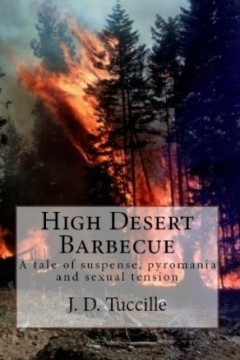
High Desert Barbecue, by libertarian author and columnist J.D. Tuccille, is a fun romp through the dry country of the southwest. The protagonists are libertarian and manage to slip in many an observation about life and the government. The antagonists are government agents, usually environmentalist wackos and bumbling idiots to boot. Mr. Tuccille does not try to hide his colors, but whatever the reader’s are he will at least find some humor and adventure in the tale, and if he is libertarian some satisfaction as well.
The story concerns a plot by environmentalists to burn out animals — humans especially — from northern Arizona so that plants may take their place at the top of the food chain and not be bothered by inferior creatures. The irony of these mammalian Forest Service enviros passionately fighting for plants, against their own kind, is thick throughout the book. One can sense the author’s amused disdain and the pleasure he takes at the antics of these defectives.
Their act of arson — referred to as “The Carthage Option” — is witnessed and filmed by Rollo, his friend Scott, and Scott’s girlfriend Lani. A chase through uninhabited territory follows, while the fire burns. The three protagonists are desperate to get the footage uploaded to the internet so that everyone can see what the government is up to. The Forest Service hippies, a group of incompetent boobs who are good for a couple dozen chuckles through the course of the story, pursue them, determined to keep the intelligence from reaching Youtube but having difficulties getting out of their own way during the chase.
[continue reading…]
Help Promote Prometheus Unbound by Sharing this Post
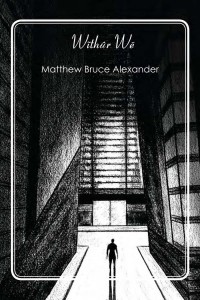
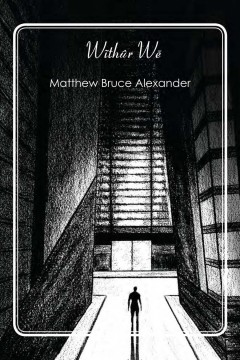
Over at Ars Gratia Libertatis (Art for the Sake of Liberty), ADUCKNAMEDJOE has a list of what he considers to be the five best free libertarian novels. The first novel of our very own Matthew Alexander made the list.
- Alongside Night by J. Neil Schulman
- Wĭthûr Wē by Matthew Alexander (Help out the author and Prometheus Unbound by buying a copy.)
- Time Will Run Back by Henry Hazlitt (Help out the Mises Institute by buying a physical or digital copy.)
- And Then There Were None by Eric Frank Russel
- A Lodging of Wayfaring Men by Paul A. Rosenberg
ADUCKNAMEDJOE also throws in as a bonus a free libertarian short story, “Lippidleggin’“ by F. Paul Wilson, about circumventing food prohibition laws. Head on over to Ars Gratia Libertatis to read his descriptions of these stories.
What do you think of the items on the list? Is anything missing?
~*~
Also via Ars Gratia Libertatis, a couple of videos on the importance of art and culture for liberty:
[continue reading…]
Help Promote Prometheus Unbound by Sharing this Post

Ted Lacksonen
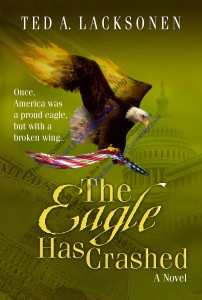
The Eagle Has Crashed is the provocative title of Ted Lacksonen’s first novel. Known as The Country Thinker on the Internet, Mr. Lacksonen has written a tale of what may be in store for this country if we don’t sober up and start walking the straight and narrow. His main concern is our mounting debt and how that could destroy our financial future and, through a chain reaction, tear our nation apart.
The near-future story follows the fortunes of many different people as a time of tribulations begins. Though a few high ranking officials do play a role, including the President of the United States, most of the characters are ordinary citizens in central Ohio, where Mr. Lacksonen lives. When the economy begins to crack, a series of mishaps, tragedies and catastrophes like a crescendo of disaster wracks the country. People become desperate and respond according to their nature, some digging in to take care of themselves, others making sacrifices for what they see as the good of the country.
Though I have some sympathy for it, I am not fully in agreement with the message of the book. I do not believe debt would be the prime driver of an economic collapse. Rather than close the deficit and pay down the debt, I would prefer to see government spending come down. I would even look favorably on, or at least view as an improvement, a budget deal that increased the deficit if it also cut revenues — that Washington euphemism for stolen money — and spending (a real cut, not the fake cuts we have been hearing about). Nevertheless, I do not argue that debt is trivial or innocuous, and it is nice to see an author use it as a backdrop for his tale.
[continue reading…]
Help Promote Prometheus Unbound by Sharing this Post
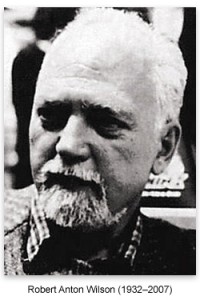
In a recent addition to the Libertarian Tradition podcast series, part of the Mises Institute’s online media library, Jeff Riggenbach discusses the life of Robert Anton Wilson (1932–2007), author of the Illuminatus! trilogy.
You can also read the transcript below:
Robert Anton Wilson was born January 18, 1932 in Brooklyn. He grew up in the section of Brooklyn known as Flatbush and, later, after his father lost his job on the waterfront, in a much poorer section of Brooklyn known as Gerritsen Beach. “Rents were very low” in Gerritsen Beach, Wilson recalled in his book Down to Earth, the largely autobiographical second volume of his Cosmic Trigger Trilogy, “because only the poor Irish Catholics lived there.” At another point in the same account, he refers to his old neighborhood as “an Irish Catholic ghetto.” Not that all Irish Catholics were poor, mind you. “My father had relatives in Brooklyn Heights,” Wilson wrote in 1991,
[continue reading…]
Help Promote Prometheus Unbound by Sharing this Post
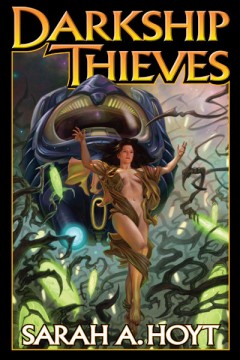
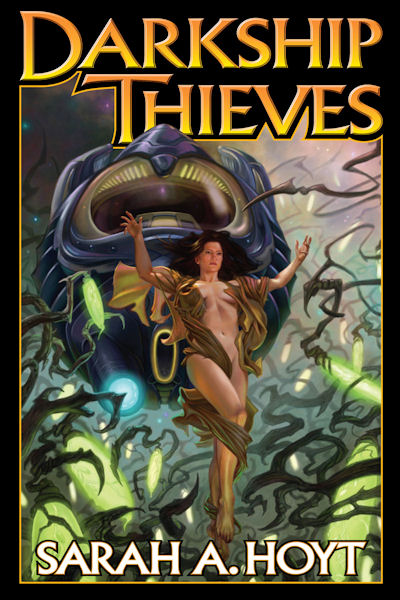 The Libertarian Futurist Society has announced this year’s winners of their Best Novel and Hall of Fame awards.
The Libertarian Futurist Society has announced this year’s winners of their Best Novel and Hall of Fame awards.
Alas, I didn’t get around to reading and reviewing Cory Doctorow’s For the Win in time for the voting, but I still plan on doing so. Matthew Alexander reviewed another of the finalists, L. Neil Smith’s Ceres.
Here’s the official press release:
The Libertarian Futurist Society will hold its annual awards ceremony for the Prometheus Award during Renovation, the 69th World Science Fiction Convention, to be held Aug. 17-21 in Reno, Nevada. The specific time and location will be available in the convention program.
The winner of the Best Novel award is Darkship Thieves, by Sarah Hoyt (Baen Books). The Hall of Fame award was won by Animal Farm, a short novel written by George Orwell in 1945. Sarah Hoyt will receive a plaque and a one-ounce gold coin, while a smaller gold coin and a plaque will be presented to Orwell’s estate.
Darkship Thieves features an exciting, coming-of-age saga in which a heroic woman fights for her freedom and identity against a tyrannical Earth. Hoyt’s novel, dedicated to Robert A. Heinlein, depicts a plausible anarchist society among the asteroids. Hoyt is a prolific writer of novels and short fiction, though this is her first time as Prometheus finalist.
[continue reading…]
Help Promote Prometheus Unbound by Sharing this Post
- Brian Defferding (?) over at Practical Praxeology tells us “Why The Hitchhiker’s Guide to the Galaxy is Better Atheist Libertarian Literature than Any Ayn Rand Book.” Do you agree?
- Digital publishing, tablets, ereaders, and the changing genre publishing landscape:
- Wired – Epicenter: “Digital Book Publishing Models to the Rescue.” A few of the interesting business models that are emerging, including J.K. Rowling’s for the ebooks of the Potter series.
- Wired – Epicenter: “Are Tablets Killing E-Readers? Um, No….”
- Adventures in Scifi Publishing podcast #124: Fascinating interview with multi-genre author Kristine Kathryn Rusch about how digital publishing is changing the genre publishing landscape and stirring up controversy: outdated accounting practices, publisher undercounting of ebook sales, shady new agent practices (including one mentioned in the first Wired article above) and whether you even need or should get an agent now, publishing and agent contracts, foreign rights, ebook rights, IP lawyers, and so on. If this podcast episode piques your interest, be sure to check out Kris’s Business Rusch series of blogposts for more on these topics.
Help Promote Prometheus Unbound by Sharing this Post
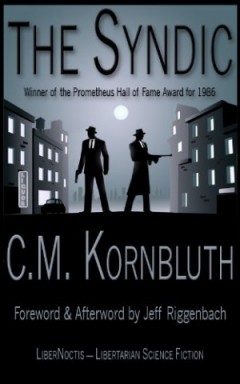
Get it for free in epub and mobi formats!
In a recent addition to The Libertarian Tradition podcast series, part of the Mises Institute’s online media library, Jeff Riggenbach discusses the brief life of C.M. Kornbluth (1923–1958) and his novel The Syndic.
You can also read the transcript below:
The late Samuel Edward Konkin III was a firm believer in the power of science fiction to spread the libertarian message. He himself had been converted to libertarianism partly by reading the works of Robert A. Heinlein, and Heinlein remained his favorite science fiction writer for the rest of his life. Every July for years, he threw a joint birthday party for himself and Robert A. Heinlein (Sam’s birthday was July 8; Heinlein’s was July 7). The last and largest issue of his magazine,New Libertarian, was devoted to Heinlein, as was a sort of mini-conference he held, also in the late 1980s, under the auspices of his Agorist Institute. This mini-conference featured presentations by Sam, J. Neil Schulman, and yours truly, along with much spirited discussion.
But if the works of Robert A. Heinlein topped Sam’s list of great libertarian science fiction, they were far from the only titles on that list. He was also a great admirer of Eric Frank Russell’s Great Explosion, for example. He expressed enthusiasm for A.E. van Vogt’s fiction, especially The Weapon Shops of Isher. And, he told me more than once in conversation, he held C.M. Kornbluth’s 1953 novel, The Syndic, in high esteem and considered it lamentably little known and much underappreciated among libertarian science fiction novels. I suspect part of the reason Sam never wrote about The Syndic was that he felt any public display of approval on his part for a writer like C.M. Kornbluth would require at least a bit of explanation. You see, Kornbluth was a Futurian, and libertarian science-fiction fans back in Sam’s heyday — the 1970s and ’80s — were almost always critical of the Futurians, if not openly hostile to them.
Libertarian science fiction fans of today care a good deal less for such ancient controversies, I suspect. Libertarian science-fiction fans under 40 are probably at least a little unclear on just who or what the Futurians were. Those old timers like me who know who they were have now lived long enough that we wonder whether it really matters who they were — whether it mattered even at the time.
[continue reading…]
Help Promote Prometheus Unbound by Sharing this Post

















